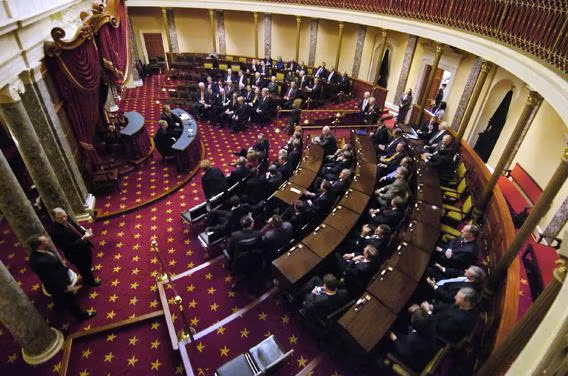LANSING – Passing a long-term energy policy remains a goal for both Democrats and Republicans in the House, and members are expected to study the proposal passed by the Senate and determine how much support it has when the Legislature returns for lame duck next month.
House Minority Leader Sam Singh (D-East Lansing), who has led the negotiations for the Democrats on energy, said Wednesday the Senate proposal (SB 437 and SB 438) is a good start.
“I am very pleased it is back over on the House side and we can have the conversation,” he said. “We have all been looking at this the entire session. People know the facts, people know the research. It is very critical we have sound policy going forward.”
House Majority Floor Leader Aric Nesbitt (R-Lawton), who chairs the House Energy Policy Committee, was not available for an interview for this story, but did say passing a long term energy proposal is a top priority heading into lame duck.
In a statement from Nesbitt last week after the bills were passed, Nesbitt said he looks forward to working with the Senate, Governor Rick Snyder and his colleagues in the House to “deliver a long-term energy plan that will provide reliable and affordable energy to Michiganders for decades to come.”
House Speaker Kevin Cotter (R-Mount Pleasant) also said last week he hopes to close the door on energy policy during lame duck.
“There is a lot of interest about energy. That is something we have been talking now about for how long,” Cotter told reporters. “It is just one of those issues that has been out there for a long period of time. So we want to address that issue. But also make sure we get it right. And there are a lot of widely varying opinions about what the right energy policy looks like.”
During the Thanksgiving break in 2015, House members were mulling bills from their own chamber after a seven-hour marathon session in the Energy Policy Committee. However, the House was never able to get traction on the floor, eventually leaving the issue for the Senate to tackle first.
The Senate bills do a variety of things, including:
- Requiring utilities to competitively bid for new generation projects with stipulations;
- Expanding the role of the Utility Consumer Participation Board and the attorney general on behalf of ratepayers when intervening in rate cases;
- Requiring all electric providers adhere to resource adequacy rules to ensure long-term capacity;
- Requiring customers moving to electric choice to pay a capacity charge to maintain reliability;
- Requiring the Public Service Commission to study performance-based rates;
- Adding 21 new positions at a cost of roughly $3 million to process cases at the PSC and the Michigan Agency on Energy; and
- In addition to a renewable energy portfolio standard of 15 percent by 2021, requiring utilities to demonstrate in their Integrated Resource Plan that they have at least 15 percent in renewable resources.
Rep. Gary Glenn (R-Midland), who has been a strong voice in the House for expanding or at the very least preserving the choice market in the state, said the bills that came over from the Senate are even worse than the bills on the House floor.
Glenn said the bills bring back former Governor Jennifer Granholm’s model of “mandates and monopolies.”
He also said he believes there are more Republicans opposed to a mandate on renewables than those opposed to the bills because of how they affect the choice market.
Singh said the Democratic caucus has not discussed the bills as a group and there is time during the next three weeks to determine if any changes should be made. He said he is hopeful the House takes a vote.
On choice, Singh said he believes the compromise put forward by the Senate does ensure the choice market remains.
“I am pleased that they were able to come to that compromise,” he said. “I do think it is important for those who are already in the system be treated fairly.”
On the renewable energy side, Singh said the Senate bills obviously do not match a plan put forward by the Democratic caucus, but he said members will have an open mind moving forward.
Singh also said he wants to study what the Senate proposal does to net metering, as the House bills did not change the current law.
Glenn said believes the Senate bills do not provide incentives for those using solar energy individually.
He also said he thinks that the energy policy conversation should be delayed further with Republican President-elect Donald Trump coming into the White House. He said the motivation behind the bills has been the President Barack Obama administration making some regulation changes and the state’s energy policy needing to reflect those changes.
“That premise has evaporated,” Glenn said. He said the Legislature has a chance to work with a Republican administration in the first half of next year.
But Singh said he doesn’t think it mattered who was elected president, there have already been significant changes in the economy and finalizing an energy plan makes the most sense.
“If you are a business and wanting to invest in the state, you need to make sure there is some sense of reliability,” Singh said. “We should have already had this done by now. We have given people uncertainty. Both chambers have researched this. Both chambers have had hearing after hearing. I think we have all of the facts.”
Gideon D’Assandro, spokesperson for Cotter, did not indicate the speaker would be interested in delaying action to next term because of Trump’s presidency.
“We’ve put a lot of time into putting together the best possible plan for Michigan,” he said. “We’re going to keep working on it and moving it forward.”
This story was published by Gongwer News Service. To subscribe, click on www.gongwer.com







